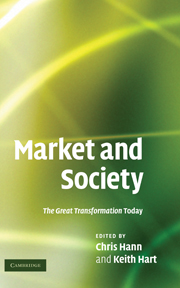Book contents
- Frontmatter
- Contents
- List of figures and table
- List of contributors
- 1 Introduction: Learning from Polanyi 1
- 2 Necessity or contingency: Mutuality and market
- 3 The great transformation of embeddedness: Karl Polanyi and the new economic sociology
- 4 The critique of the economic point of view: Karl Polanyi and the Durkheimians
- 5 Toward an alternative economy: Reconsidering the market, money, and value
- 6 Money in the making of world society
- 7 Debt, violence, and impersonal markets: Polanyian meditations
- 8 Whatever happened to householding?
- 9 Contesting The Great Transformation: Work in comparative perspective
- 10 “Sociological Marxism” in central India: Polanyi, Gramsci, and the case of the unions
- 11 Composites, fictions, and risk: toward an ethnography of price
- 12 Illusions of freedom: Polanyi and the third sector
- 13 Market and economy in environmental conservation in Jamaica
- 14 Embedded socialism? Land, labor, and money in eastern Xinjiang
- 15 Afterword: Learning from Polanyi 2
- Bibliography
- Index
15 - Afterword: Learning from Polanyi 2
Published online by Cambridge University Press: 08 August 2009
- Frontmatter
- Contents
- List of figures and table
- List of contributors
- 1 Introduction: Learning from Polanyi 1
- 2 Necessity or contingency: Mutuality and market
- 3 The great transformation of embeddedness: Karl Polanyi and the new economic sociology
- 4 The critique of the economic point of view: Karl Polanyi and the Durkheimians
- 5 Toward an alternative economy: Reconsidering the market, money, and value
- 6 Money in the making of world society
- 7 Debt, violence, and impersonal markets: Polanyian meditations
- 8 Whatever happened to householding?
- 9 Contesting The Great Transformation: Work in comparative perspective
- 10 “Sociological Marxism” in central India: Polanyi, Gramsci, and the case of the unions
- 11 Composites, fictions, and risk: toward an ethnography of price
- 12 Illusions of freedom: Polanyi and the third sector
- 13 Market and economy in environmental conservation in Jamaica
- 14 Embedded socialism? Land, labor, and money in eastern Xinjiang
- 15 Afterword: Learning from Polanyi 2
- Bibliography
- Index
Summary
The essays in this important collection pose the central issues facing the field of economic anthropology today. After the triumph of formalism in the debate with the substantivists, the question became whether any such subfield could continue to exist at all. This collection shows that a theoretically coherent field called economic anthropology is not only possible but vitally necessary and that its revival is underway. What will give this revived discipline coherence and what are some of the issues that it will have to confront? The classical work of Polanyi, shorn of the restrictions placed on it by Dalton (Isaac 2005), offers a point of departure for answering these questions, but many issues remain unresolved.
Taken as a whole, these essays suggest a tentative convergence between aspects of economic anthropology, economic sociology, and the new institutional economics. This synthesis is by no means unproblematic, and indeed several of the papers (Gudeman, in Chapter 2, and Beckert, in Chapter 3) argue that a considerable number of obstacles have to be overcome. In the end, reconciliation may not be possible, given the fundamentally individualistic and rationalist assumptions of the new institutional economics (see Gudeman's critique of Landa above). Notwithstanding these reservations, we may discern the outlines of what such a synthesis might look like. To focus on purely economic structures, mechanisms, and actions is properly the domain of the discipline of economics.
- Type
- Chapter
- Information
- Market and SocietyThe Great Transformation Today, pp. 272 - 283Publisher: Cambridge University PressPrint publication year: 2009
- 7
- Cited by



